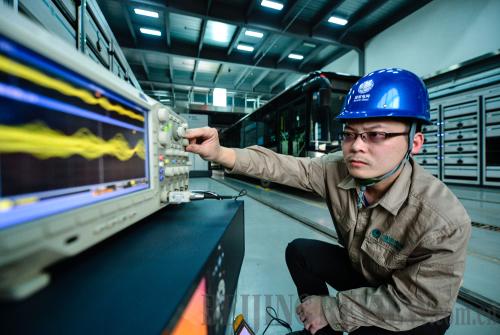|
 |
|
CURRENT DEVELOPMENTS: An engineer tests equipment at Tianjin Haitai Integrated Filling Station, which has the facilities to recharge electric cars (WU XUANSHU) |
More Quotas
China granted new investment quotas of 29 billion yuan ($4.7 billion) to qualified foreign institutional investors (QFIIs) in March as the country moves cautiously to encourage capital flows.
Of the quota, $1.45 billion was granted to six investors under the QFII program, and 20.1 billion yuan ($3.24 billion) was made to renminbi-denominated qualified foreign institutional investors (RQFIIs), according to data from the State Administration of Foreign Exchange.
China's currency, the yuan, is convertible for trade purposes under the current account, while the capital account, which covers portfolio investment and borrowing, is still largely controlled by the state over concerns of abrupt capital flows moving in and out of the country.
To gradually open the capital account, QFII and RQFII programs were introduced, under which foreign investors are given a certain quota to move money into China's capital account, to encourage flows.
As of March 28, 241 overseas institutions have received QFII quotas amounting to $53.6 billion, and the volume under the RQFII scheme totaled 200.5 billion yuan ($32.3 billion).
PMI Expands
The purchasing managers' index (PMI) for China's manufacturing sector rose to 50.3 percent in March, up from 50.2 percent in February.
It is the first month-on-month rise since November, according to a statement jointly released by the National Bureau of Statistics (NBS) and the China Federation of Logistics and Purchasing.
The index shows China's manufacturing sector is stable, said Zhao Qinghe, a senior analyst with the NBS, who attributed the rise to the resumption of production and business after the Spring Festival holiday (January 31-February 6).
Meanwhile, the PMI for the non-manufacturing sector stood at 54.5 percent in March.
Surging External Debt
China's outstanding foreign debt had hit $863.2 billion by the end of 2013, up 17 percent over the previous year, data from the country's forex regulator showed on March 31.
Of the total outstanding external debt, registered external debt reached $526.7 billion, while the balance of trade credit between businesses amounted to $336.5 billion.
Most of the debt owed to foreign creditors resulted from short-term borrowing, as outstanding external debt with a term of one year or less amounted to $676.6 billion, while long- and medium-term outstanding external debt came in at $186.5 billion.
In terms of currency structure, debt denominated in U.S. dollars accounted for 79.6 percent of the outstanding registered external debt, and that in euros and Japanese yen accounted for 5.54 percent and 5.02 percent, respectively.
Preliminary calculation showed China's foreign liability ratio of 9.4 percent, debt-to-GDP ratio of 35.59 percent, and debt-service ratio of 1.57 percent were all within the internationally recognized safety range.
Rare Earth Exchange
China's first rare earth products exchange opened on March 28 in Baotou, Inner Mongolia Autonomous Region after a three-month trial.
The Baotou Rare Earth Products Exchange is expected to regulate the country's rare earth market, improve the way prices are formed and promote development of the industry, said Jia Yinsong, an official from the Ministry of Industry and Information Technology.
The exchange will introduce three spot transaction modes, namely price bidding, listed trading and real-time trading online, with more than 10 trading items including cerium oxide, praseodymium-neodymium oxide and europium oxide.
The exchange was initiated by Baotou Steel Rare Earth (Group) Hi-Tech Co., China's leading rare earth producer, and another 11 firms and institutions with a registered capital of 120 million yuan ($19.32 million).
| 